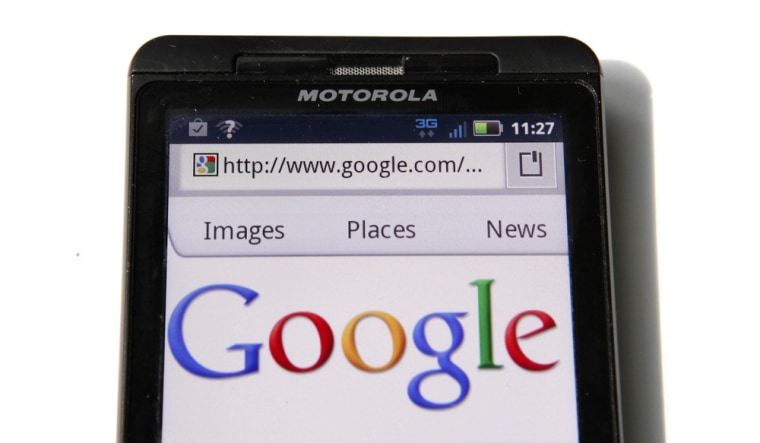Google’s surprise announcement that it will buy Android phone maker Motorola Mobility for $12.5 billion Monday quickly led to speculation that the search giant is gearing up to build an iPhone-killer.
Sorry, Android fanboys, that’s not going to happen. Turns out Google isn't really buying Motorola Mobility for its handsets. Instead, what Google really wants is the company's massive cache of 17,000 patents (and 7,000 more pending), analysts say.
The distinction is important because if the Google-Motorola deal is approved by regulators it will shake up the hierarchy of mobile computing heavyweights, said Michael Morgan, senior analyst for mobile devices at ABI Research.
“People are starting to realize that Google could become the Microsoft of the mobile world,” Morgan said.
Google is battling Apple and Microsoft, among others, over patent issues, and its handset partners have been facing similar challenges. So Google needs more than a toehold in this intellectual property turf battle.
Motorola is one of the oldest mobile manufacturers and has a veritable patent fortress. Google’s rivals have hammered away at handset makers Samsung and HTC over patent issues but so far have been disinclined to draw Motorola into litigation.
(Msnbc.com is a joint venture of Microsoft Corp. and NBCUniversal.)
“This was a necessary-slash-defensive move,” Mark Mahaney, analyst and Internet research director at Citigroup, told CNBC.
Google’s acquisition seems to leave other Android handset manufacturers in limbo, since a handset made by the search giant itself would seem to have huge built-in advantages. But most analysts think the company will keep its commitment to open-source innovation.
“Hopefully, Google will be willing to share this with the ecosystem,” said Morgan of ABI Research. “I can’t believe they want to hinder the other (manufacturers') progress with Android.”
Morgan suggests Google could keep Motorola as a kind of test lab for Android, creating branded phones similar to the HTC Nexus that would let Google developers try new features and functions.
Others think Google might discontinue Motorola’s manufacturing operations entirely.
“I wouldn’t be surprised to see it get phased out,” said Jonathan Chaplin, director of telecommunications equity research at Credit Suisse. “The handset business in general isn’t a great business.”
The smartphone and tablet arenas are where Google’s new purchase will have the most impact. Microsoft faces an uphill battle, Morgan said.
“Microsoft will just have to accept the fact that they can’t play in the mobile space. They’ve been in denial of that for a long time,” he said.
Google’s entrance into hardware also nudges the once-dominant Blackberry toward the exit," he said.
“Research In Motion, Microsoft — those are the [companies] that are going to get pushed out of the pool.”
What about Apple? The iPhone has lost market share to competing Android-based phones, but it’s still a formidable competitor. According to market research firm comScore, the Android platform had 38.1 percent of the market in May of this year, compared to 26.6 percent for iPhone’s operating system. But no single Android phone is as popular as the iPhone.
“The future of the iPhone is perfectly safe,” Morgan said. “It was never going to take over the world, but it will lead the world for a long time.”
Google might encroach more seriously on the nascent tablet market, where Apple’s iPad still has a head start on other manufacturers.
In other words, the future of smartphones and tablets will look a lot like the desktop computer market that it’s rapidly supplementing, if not replacing: Apple with a small but consistent slice of the market on the high end of the price spectrum, and a something-for-everyone panoply of Android-based devices at all levels of price and functionality beneath it.
Whether the market is big enough for the current market’s other players remains to be seen.
